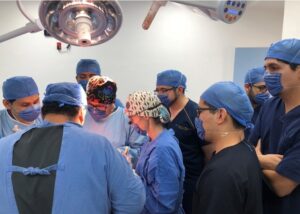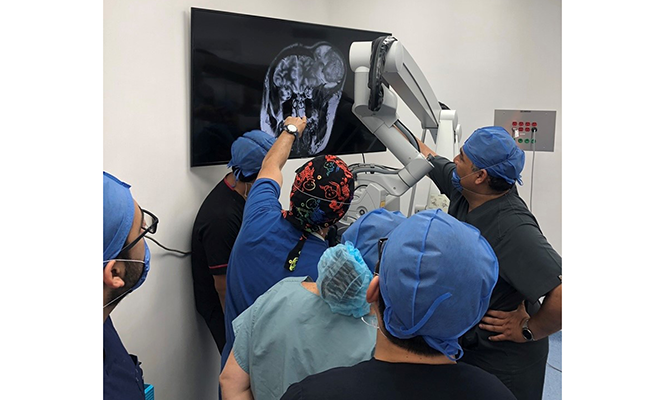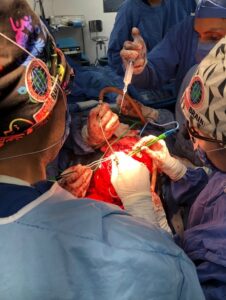Giving Back with Mission:BRAIN
Destination Mexico City, 2018. It was 7 am on a Monday morning. The team arrived to Hospital Juarez to meet local colleagues before surgery. Three challenging procedures were scheduled for that day, but one caught our full attention. We had only seen the patient’s MRI, imaging was impressive and prompted a long discussion between neurosurgeons the day prior. Now, it was time to see the tumor face-to-face.
The patient was brought in – the room became extremely silent. The patient, whom we will refer to as “Miguel,” was a 23-year-old young man. His family could not afford any type of medical care, so the tumor progressed and reach inhumane growth. He had a mass that was twice the size of a baseball. Miguel’s face was completely deformed by the tumor, but there was one thing that was clear in his eyes: hope.
 Diagnosis was a giant frontotemporal hemangiopericytoma with both intra- and extracranial components. It was highly vascularized with the middle cerebral artery coursing right through it. This was the second attempt at resection and because of the complexity of this case, Dr. Ayala – the attending at Hospital Juarez – wanted to perform a second surgery with our team. Despite not speaking the same language, doctors and nurses inside that room were working in synchrony with the ultimate goal of helping Miguel and his family.
Diagnosis was a giant frontotemporal hemangiopericytoma with both intra- and extracranial components. It was highly vascularized with the middle cerebral artery coursing right through it. This was the second attempt at resection and because of the complexity of this case, Dr. Ayala – the attending at Hospital Juarez – wanted to perform a second surgery with our team. Despite not speaking the same language, doctors and nurses inside that room were working in synchrony with the ultimate goal of helping Miguel and his family.
While anesthesia was prepping the patient, we were getting ready for action and could sense the nervousness of the surgeons as they continued to discuss the imaging. Around 8:45 in the morning, Dr. Ayala did the timeout. At that moment the nervousness of the nurses, anesthesiologists, residents and surgeons shifted to determination. Afterward, we all took our place in the OR to perform the tasks that we were responsible for. We had one objective — help Miguel fight this tumor. As volunteers, our job inside the OR was to document the case, to serve as medical translators, if required, and to support the team.
The case started. A lot was happening at the same time. We could smell the bipolar burning the skin. We could hear doctors discussing the case with residents in two different languages. We could see how doctors were learning from each other, utilizing different techniques to approach the same lesion. Most importantly, we knew that something extraordinary was happening.
After the lesion was exposed, attendings scrubbed in and started their battle. It was a belligerent and highly vascularized tumor. All we saw were bloody gauzes coming out while the anesthesiologist quickly hung bags of blood. Despite language and cultural barriers, the doctors were dancing with each other. They were communicating through the art of surgery. After three hours, Miguel’s cardiovascular system began to fail. “We were at a stage where Miguel’s life was in danger and we had gotten to a point where we could stage the tumor,” Dr. Quiñones recalls. The procedure had to be stopped. The surgeons were able to remove enough of the tumor that Miguel would be able to survive long enough for an additional future resection.
When talking with Miguel’s family, we saw a mother filled with gratitude and hope. Without Mission:BRAIN, her son would have never received the operation that he needed. Miguel’s disease had created a tremendous economic and emotional burden in his family and our team helped alleviate this. Not long after, Miguel underwent successful embolization and resection. All associated costs were covered by Mission:BRAIN.
Treat, Educate, Empower – these are the core elements of Mission:BRAIN. Founded in 2010, Alfredo Quiñones-Hinojosa MD, FAANS; Michael T. Lawton MD, FAANS; April M. Sabangan RN; Lisa T. Hannegan, MS, CNS, ACNP; and Will Aarsheim partner with health care professionals around the world to help the ones most in need. Every year, the foundation continues to support hospitals, to provide neurosurgical care, to exchange knowledge and to create a sustainable network with the sole purpose of advancing international neurosurgery. The team has taken care of hundreds of patients just like Miguel in several countries in Latin America and Asia with plans to expand our horizons to other corners of the world.
There is much work to be done and this is just the beginning. Mission:BRAIN continues to give back to help those most in need. We will continue to partner with physicians, nurses, residents, medical students and volunteers because we believe that together we can change the world.











